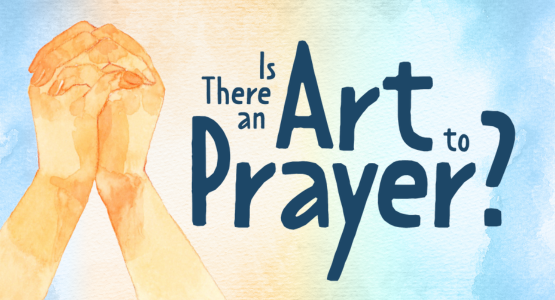
Is There an Art to Prayer?
By Tompaul Wheeler and Ricardo Bacchus
The beauty and mystery of prayer has captivated believers for thousands of years. People find meaning, solace and the miraculous in prayer, yet many still struggle with the Divine-human connection.
Is God more likely to respond to certain kinds of prayers? Is there a secret to connecting with God? Are some prayers simply more “powerful” than others?
'People Struggle With Prayer'
“I notice that prayer is uncomfortable for many Seventh-day Adventists,” observes Diana Kellawan. “Many struggle with what prayer is and how to come to God in prayer. There’s some kind of hindrance. I don’t know if it’s because of legalism, but there is something that blocks our faith community, and it’s oppressive.”
Kellawan teaches a Sabbath School class, leads weekly Bible studies, directs Women’s Ministries and is involved in Prayer Ministries at Ohio Conference’s Kettering church in Dayton.
“I see people struggle with prayer—like they don’t feel good enough,” Kellawan says. “They feel intimidated by it, awkward about it. Some people believe you shouldn’t pray about everything because God isn’t that interested in [those small details] anyway.”
Kellawan believes that our view of God shapes our view of prayer, and that many Adventists don’t have the confidence to come to God because they feel they aren’t worthy enough to commune with Him.
But, once people overcome this struggle, they find power in prayer.
This past year, Kellawan’s Sabbath School class has been studying spiritual warfare and claiming God’s promises. “Individuals in our class have experienced spiritual and emotional healing,” Kellawan says. “Relationships that have been broken [have been] brought together. Dysfunctional families have seen God intervene in very specific ways.”
Kellawan feels strongly that freedom is the key—the freedom to know that you can approach God, “to know that He forgives our sins and that He breaks us from those strongholds that hold us for years and years. ... He’ll pick us up when we fail, heal our souls and rescue us.”
 A Prayer for Each Day of the Week
A Prayer for Each Day of the Week
“I have a plan for prayer,” says Lawrence Rykard, a member of Potomac Conference’s Light Bearers Mission church in Suitland, Md., who has recently relocated to Delaware and runs Herbspice, a small health food products business. Rykard’s approach to prayer time is systematic, beginning each day with devotions. A daily prayer list helps him focus on the various needs he sees around him.
On Sundays, Rykard prays especially for his family, while on Mondays he gives particular attention to his friends. “Tuesdays I call it my ‘souls’—people whom I’m trying to share God’s love with or who may be in need of something spiritually,” he says. “Wednesdays are my prayer list for the church. I’ll pray for the conference, the union and the supporting church organizations. Thursdays I pray for Herbspice. Fridays I pray for leadership and … for religious liberty for all the world governments so the gospel can go forward. On Sabbath, I don’t really have a list; I just pray for what God puts on my heart.”
Rykard also prays regularly with other people in his life, and frequently leads online Bible studies.
“Yes, there’s a right and wrong way to pray,” Rykard opines. He points to Jesus’ counsel about avoiding “vain repetitions” in prayer (Matt. 6:7, NKJV). “I would take it He is meaning to pray from your heart.” Rykard believes prayer should be “speaking with someone you’d like to get to know and have a relationship with, versus chanting and repeating the same thing over and over like you’re not talking to a real person.”

Communicate With Him at Every Level
“I think God wants us to communicate with Him at every level,” says Jon Kim, a physical therapist and member of Chesapeake Conference’s Ellicott City (Md.) church. “A brand-new believer may not know exactly how to pray, so they try to communicate [with] God in whatever way they know how. I think God accepts the prayers of those who may not have the deep biblical understanding of prayer who just want to talk to Him. … I think God loves the fact that we are trying to talk with Him at whatever stage we are in. At the same time, as Christians, it’s important to study the stories of prayers in Scripture and glean as much as we can from them.”
Kim looks to Daniel’s prayer for his people (Daniel 9:4–19) and David’s prayer of repentance after his assault, adultery and murder (Psalm 51) as examples of how to approach God. “You can almost sense how dirty David felt,” Kim considers. “He cries out to the only One who can wash him clean.”
Kim has worship each morning with his sons, ages 3 and 7. “My kids know that we are a house that worships the Lord,” he says. “Although they don’t fully understand everything, they understand that every morning we worship together. I’ll have them repeat after me, and I say short prayers with them.”
As a child, Kim learned a specific physical posture of prayer—kneeling on the ground, eyes closed, hands folded. Nowadays, this might not be a typical approach. “I don’t think there’s anything wrong with that way,” Kim reflects, “but I think if I’m out for a walk, driving my car … I think those prayers are just as acceptable.”
Kim prays while commuting to work, giving God the burdens that are on his heart. “When I’m at work, before I start seeing patients, I’ll just say a quick prayer in the break room,” he says. “I’ll just whisper prayers as I’m going, just less formal and quick, short prayers.”
How Prayer Works
“There are numerous misconceptions about prayer, many of which stem from misunderstandings of God’s character and divine providence,” shares John Peckham, a professor at the Seventh-day Adventist Theological Seminary at Andrews University (Mich.) and an associate editor of the Adventist Review. “Some might think, for example, that we need to convince God to be willing to bless us when, in fact, God already wants to do what is best for everyone and loves us more than we can imagine.”
He adds, “There are many other misconceptions regarding how prayer works, including puzzling questions about how petitionary prayer could make a difference in the first place and, if it does, why many prayers for obviously good things seem to go unanswered.” For such questions, he believes “it is crucial to pay close attention to the many teachings of Scripture about how prayer works and the many factors involved (including many we do not see), which are closely linked to the pervasive cosmic conflict framework in the Bible (including in the Lord’s Prayer itself; see also Ephesians 6:11–12, 18).” Peckham discusses this in detail in his recent book, Why We Pray: Understanding Prayer in the Context of Cosmic Conflict.
He writes, “If you are in Christ by faith, you cannot be a failure, whatever befalls you in this life. Christ has already defeated the devil’s slanderous allegations at the cross, so if you are in Christ by faith, you cannot lose. ... You cannot in your own power fix your troubles, improve your moral character, or be deserving of God’s favor. But, God graciously bestows favor on all willing to receive it and will make all things right in the end. Through the intercession of Christ and the Holy Spirit, God delights to show unmerited favor (grace) to all who call on his name” (p. 148).

Add new comment